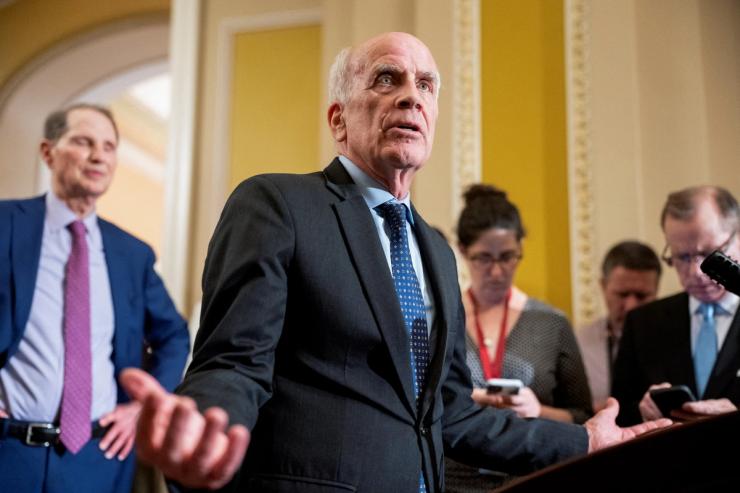The News
Democrats are betting that voters won’t remember the government shutdown a year from now, but will remember that the opposition party fought for reducing health care costs.
After years of positioning themselves against government shutdowns as a matter of principle, Senate Democrats are holding their position far more firmly than during a similar fight over immigration protections in 2018. On Friday evening, they will surpass the length of that year’s three-day Trump-era shutdown.
The gap in government services will be painful, and Democratic senators and aides report constituents are already peppering them with questions about the shutdown.
But for a party relegated to the minority in a Washington deluged by President Donald Trump’s flood of executive power exercises, picking this fight was more or less their only option left to get people to pay attention.
“If it seems about health care, then this will have been worth the effort. It’s unknown,” Sen. Peter Welch, D-Vt., told Semafor. “People hate shutdowns. And I hate shutdowns. So why are we doing it? It’s because, essentially, the whole Obamacare healthcare success we have is being unraveled.”
Democrats are a footnote in the first nine months of Trump’s presidency, sidelined on negotiations that hacked away at the Affordable Care Act’s Medicaid expansion and cut out of any negotiations to raise the debt ceiling. They have little say on Trump’s nominees, and Republicans dramatically reduced their ability to even delay those confirmations.
So for a party looking to make comebacks in Congress in 2026 and the White House and 2028, there’s not much ground left to make a stand aside from government funding. And they sense weakness in Republicans’ long-term position on health care, even if the short-term pain is real.
“They’ll remember that we fought for health care and that we cared,” said Sen. John Hickenlooper, D-Colo., a former governor. “No one wants [a shutdown], especially someone like me who’s used to getting stuff done. It’s my choice of last resort … this seems like the only way we can get our voice heard.”
Democrats held a long caucus meeting in the hours before the first US shutdown in six years. Unlike the circular firing squad they descended into during March’s funding deliberations, there was little dissent other than the three Democrats who supported Republicans’ stopgap spending bill on Tuesday night.
Once Democratic leaders got buy-in from the caucus’ former governors like Hickenlooper and New Hampshire Sens. Maggie Hassan and Jeanne Shaheen — who signed onto the fight despite some reservations — they realized the party could hold the line, for a few days at least.
Republicans are betting that position will erode. Senate Majority Leader John Thune, R-S.D., said plenty of Democrats “want out of this rathole.”
They need five more Democrats, though, and the party’s leaders don’t see that happening anytime soon. And until they do, Republicans say Democrats won’t get the health-care deal they seek.
“We’re not going to negotiate on anything until we get past this shutdown,” said Sen. Mike Rounds, R-S.D., who is in daily discussions with Democrats. “Somehow this works in their favor? I don’t see it that way at all. Our Democratic colleagues are going to run out of time.”
In this article:
Know More
The public does not have a long memory when it comes to shutdowns. The White House nonetheless sees the funding battle damaging Democrats.
“Americans will remember that the Democrats shut down the government and forced hardworking Americans to suffer because they wanted to give free health care to illegal aliens,” said Abigail Jackson, a spokeswoman for the White House.
One early poll actually shows Republicans taking more of the blame for the shutdown than Democrats. But that short-term view isn’t driving Democrats’ strategy. Crucial federal races are 13 months away, an eternity in politics.
“A year from now, people will remember Democrats fought to protect access to affordable health care while Republicans resisted it at every turn,” said Sen. Elizabeth Warren, D-Mass.
“No one in our caucus wants to see people lose health care. And that has provoked a willingness to fight back, that I haven’t seen in a long time,” she added.
Republicans provoked a shutdown at the exact same point in the calendar in 2013 over defunding Obamacare — and the polls at that time were bad for the GOP. One year later, they enjoyed a huge red wave at the ballot box.
Even Republicans agree that a shutdown is not going to be the animating issue in the next election.
“There’s some truth to that. Attention spans are getting shorter every year. But I don’t think actually the health care thing is to their advantage,” said Sen. Kevin Cramer, R-N.D.
Room for Disagreement
Three Democratic caucus members think the long-term fight over health care is worthwhile — but not at the expense of the shutdown. Sens. John Fetterman, D-Pa., Catherine Cortez Masto, D-Nev., and Angus King, I-Maine, all supported both the House-passed stopgap bill as well as a Democratic bill reversing the GOP’s spending cuts and funding the government.
“The real impact that I’m concerned about isn’t the political. It’s all of the lives that are going to be significantly impacted by this and that depend on the government,” Fetterman said.
Burgess’s view
Democrats believe that they needed to do something, anything, to shift the narrative that they weren’t doing enough to fight Trump.
And because that’s been a prevailing view in both House Democratic caucuses all year, it was easy for Senate Minority Leader Chuck Schumer and House Minority Leader Hakeem Jeffries to galvanize their caucuses around this strategy, even with the added risk that a shutdown poses..
Even so, you won’t hear most Democrats owning the shutdown. It’s simply not in their DNA the way that it was for conservatives back in 2013.
“I’m not happy about a shutdown. But I am truly not happy about the possibility of tens of thousands of Americans dying unnecessarily,” Sen. Bernie Sanders, I-Vt., told me.
Notable
- Red-state Democrats are gone from the Senate and that’s affecting the party’s strategy, NYT reports.


